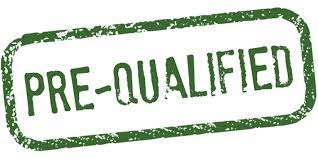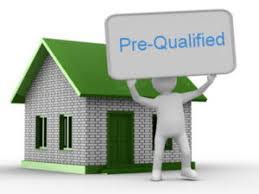Pre-Qualified for Your Mortgage… What Does that Really Mean???
There is a myth out there that once you’re pre-qualified for a mortgage, you’re good to go out and buy a home… with a no subject offer… DON’T do it!
Pre-qualified means that based on being able to PROVE (through documentation) your CURRENT income, expenses, down payment and credit bureau you SHOULD be able to get fully approved once you find the right property (this is the first half of the equation).
Remember that there cannot be any major changes to the your mortgage application details prior to the completion of their purchase as it may affect the your qualifications and change the conditions of the approval.
I always recommend my clients put in a “subject to financing” clause with their realtor when they are putting in an offer to protect themselves.
Here’s why:
The lender can like you and your financial picture, BUT the lender doesn’t know which property you want to purchase (this is the other half of the equation). Here are 3 examples:
- A bidding war has bid up the price and the best offer (yours) has been accepted. YIPPEE!!! The lender sends in their appraiser to determine the value of the property. The appraisal comes in at a lower price than your accepted offer DRATS!! Depending on the amount of your down payment, you may have to come up with the difference between the appraised value and your offer, since lenders will only offer a mortgage based on the appraised value of the home.
- You are buying a condo/townhouse and the strata minutes indicate that there are: leaks, electrical issues, roofing problems, etc. that the strata needs to act upon. If the Strata doesn’t have a big enough contingency fund, the lender can decline due to potential special assessments down the road.
- Property zoning – if the zoning is anything other than residential then your options will be limited. Some condos are zoned commercial if there is a large commercial component to the complex. Industrial, Agricultural Land Reserve (ALR), or leasehold (government or otherwise) limit a buyer’s options.
As you can tell “you may be pre-qualified” but most certainly the subject property is not!!
There are several properties that most lenders will not touch these days. Here’s a (partial) list of property details that can affect most lender’s decisions on approving your mortgage:
- A remediated grow-op or drug lab
- Leased land or co-op
- Age-restricted property
- Special assessment (pending or otherwise)
- Any reference to water or leaks in the minutes
- A “fixer upper”
- Contains asbestos, vermiculite insulations or has (even partial) knob-and-tube or aluminum wiring
- Is on land with a commercial zoning component
- Livestock is present, etc.
- Self-managed strata’s (no strata management company)
- Size of the property- below 500 sq. feet,
- Doesn’t use municipal sewage or waste
- Over 1 Acre and/or multiple buildings
- Ongoing or upcoming assessments or legal proceedings
- Strata with small contingency fund
The lender reviews the details of each property in detail once you have an accepted offer in place.
It’s important that the real estate agent discloses the information to their buyer ASAP so that it can be brought to the lender’s attention. The agent should be proactive in getting all documentation pertaining to the building/property, so that the buyer can make an educated buying decision. Many of the issues stated above can affect the long-term value and marketability of a property.
If you have a “subject to financing” clause in your purchase agreement, and you can’t find a lender (for whatever reason), then you can back out of the deal with no financial repercussions.
In my opinion you need to always put in a “subject to financing clause” as that’s the best protection you have. With subject free offers you could forfeit your deposit (and facing potential legal action from the seller) should you want to cancel your contract after the agreement has been made, even though you were technically “pre-qualified”.
As you can tell there is lots to discuss about buying homes including being pre-qualified!!
As an independent mortgage broker, I work with 90+ lenders, which gives my clients access a wider variety of lender choices to find you a mortgage for challenging situations.
Give me a call and let’s have a chat!!
Kelly Hudson
Mortgage Expert
Mortgage Architects
Mobile 604-312-5009
Kelly@KellyHudsonMortgages.com
www.KellyHudsonMortgages.com








